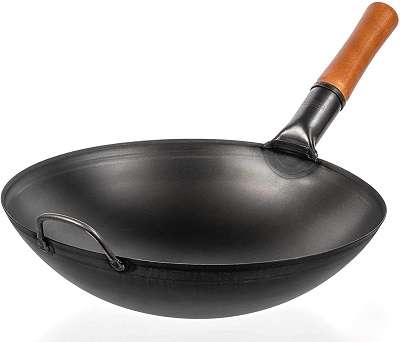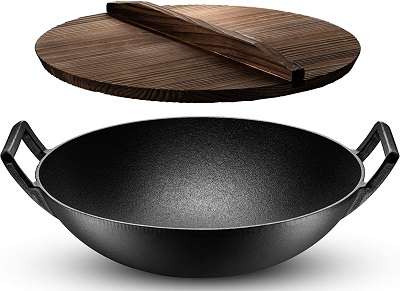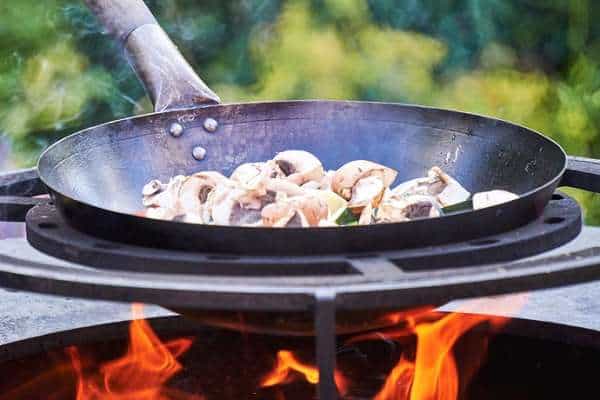
When it comes to choosing a wok, there are a few different materials you can pick from. Carbon steel vs cast iron wok are two of the most popular materials, but which one is better?
In this blog post, we will take a look at the pros and cons of both materials so that you can make an informed decision when purchasing your next wok.
Carbon steel wok
Carbon steel is a robust and hardened metal found in kitchen utensils. In the case of wok, carbon steel allows for even heat distribution and will not rust or chip easily because it has been treated with a coating to prevent these issues from occurring.
Carbon steel woks are very durable, and you can use them on all types of stovetops, including induction. Many chefs prefer carbon steel woks because they are easy to use, and you don’t have to worry about them rusting or corroding over time.
When purchasing a carbon steel wok, many people are concerned with how it can react with certain foods. It has been said that acidic foods like tomato sauce can react with the metal in the wok and make it turn specific colors, especially if you do not correctly season your carbon steel wok when you first purchase it.
While this is true, you should not have any problems if you take care of your carbon steel wok by seasoning it often and avoiding cooking highly acidic foods in the wok for long periods.
A popular type of carbon steel wok is the traditional cast iron wok, which has become increasingly harder to find in modern times because cast iron woks are often thinner and lighter than their traditional counterparts and contain more chemicals that make them non-stick. If possible, look for a wok that is 100% steel, with no coating or chemicals.
Another factor to consider when purchasing a carbon steel wok is the handle. Handles on some woks can get pretty hot while cooking, so you will want to choose a carbon steel wok with a wooden handle instead if this is an issue. Wood handles can also help prevent your hands from getting burnt when transferring the wok to different locations.
Carbon steel is one of the best materials for a wok because it heats up quickly, is easy to use, and lasts forever. Be sure to purchase a carbon steel wok with a good warranty and take good care of your wok by seasoning it often.
Cast iron wok

Some people are wary of cooking acidic foods in a cast iron wok because they are afraid that the acidity will corrode or rust the wok. This is only partially true, as long as you take good care of your cast iron wok and season it often.
While acidic foods can cause a cast iron wok to rust, it can happen with carbon steel and many other metals if you do not take care of them.
While it is true that acidity can corrode a cast iron wok over time, these types of woks typically have a much thicker coating than their carbon steel counterparts, so they will not rust as easily.
Most woks made from cast iron have a porcelain coating on the inside, which helps prevent acidic foods from reacting with the metal and causing corrosion.
Most cast iron woks come pre-seasoned, which means you do not need to season them yourself before using them for the first time. However, you will want to season your wok after every few uses so that it can maintain its protective coating and prevent corrosion.
While some people say that they have successfully used a cast iron wok at the dinner table without seasoning it first, doing this can cause your food to taste slightly metallic because of the way the acidity affects the wok.
When choosing a cast iron wok, you may find that woks with wooden handles are easier to use than their wok counterparts because the cast iron tends to get hot after extended cooking time, while wood handles will not get nearly as hot. If possible, try to look for an easy-to-hold carbon steel wok with a wooden handle to be easier to control and move around.
If you take good care of your cast iron wok, then there is no reason you should not be able to use this type of wok for many years without worrying about corrosion or other problems.
While carbon steel woks can sometimes come with a coating that makes them non-stick, cast iron woks do not typically have the same type of paint to help them avoid sticking. Because of this, you will need to season a cast iron wok before using it if you want to create traditional fried rice or other dishes.
Carbon Steel vs Cast Iron Wok: Which is better?

Carbon steel wok vs cast iron wok are excellent materials for woks, but which one will suit your needs best depends on your personal preferences and cooking style.
Carbon steel heats up quickly but cools down rapidly, so it might be best for someone who prefers to make dishes that require short cooking times. Cast iron holds heat longer but isn’t as quick to heat up, so it’s better suited to those who prefer its food over a high flame.
What’s The Difference Between carbon steel vs cast iron wok
Carbon steel is lighter than cast iron, making it easier to transport even when full of food. Some people find that carbon steel woks are not as heavy and hard to use as some cast iron woks can be.
On the other hand, cast iron woks retain their heat longer than carbon steel woks, which you may want to look for if you are making fried rice or another type of dish that requires the wok to maintain a high heat for an extended period.
Carbon steel and cast iron both have pros and cons, so it is essential to consider your needs before deciding which one makes the most sense for your cooking situation.
What is the best type of wok to use
The ideal weight, size, and shape of a wok will depend on the type of cooking you plan to do with it and your personal preferences. You may prefer a carbon steel or cast iron wok over another type of wok due to its weight, durability, or how it heats up.
Whether you are making fried rice, stir-fried vegetables, or another dish for dinner tonight, having the right wok can make all of the difference in creating the perfect meal. If you are looking for an excellent new wok to use at home, you may consider buying carbon steel vs cast iron wok.
How Should I Season A Wok?
Before you use your wok for the first time, it is important to season it properly to prevent food from sticking and ensure that your wok is ready for cooking.
The first step in seasoning a wok is to wash it with hot water and dry it thoroughly; then, you will want to coat the entire surface of the inside of the wok with an even layer of vegetable oil or another type of cooking oil.
You can also season the outside of the wok, but don’t forget to wipe it off before cooking with your new wok. Next, you will want to heat your wok over extremely high heat until the oil begins smoking. Allow the wok to cool down before washing it under hot water and dry it again. Repeat this method a few times to make a smooth and non-stick surface on your new wok.
Is my carbon steel wok safe to use?
Carbon steel is generally considered safe for cooking, but just like other materials used to make cookware, it can be dangerous if not cared for properly. Since carbon steel is made out of iron, it can rust if you don’t dry your wok correctly after washing it. If this happens, you may be at risk of ingesting small amounts of iron when you use your wok to make a meal.
Be careful not to scratch or nick the inside surface of your carbon steel wok because this, too, can lead to rust. If your work is starting to rust, you can try scrubbing it clean with steel wool and reseasoning the wok’s surface after washing it in hot water and drying it well.
FAQ About carbon steel vs cast iron wok
How often should you clean a wok?
But if you are making a dish that requires a lot of stir-frying, then you may want to give your wok a quick scrub and a rinse before cooking the next round because the food will likely stick less if there is no layer of oil or sauce on the inside of your wok.
How do you clean a cast iron wok?
If food sticks to your cast iron wok’s surface, try scrubbing it with kosher salt to remove any stuck-on bits. You can also use coarse ground black pepper or medium/fine steel wool if you need to remove any rust from the cast iron wok’s surface.
Is it safe to use a cast iron wok on an electric stove?
Can I use my cast iron wok on a glass stove?
What do I clean my carbon steel woks with?
But if you find yourself with a wok that has become rusty, you can scrub it clean with steel wool and reseason the pan’s surface after washing it in hot water and drying it well.
How should I dry my carbon steel wok?
Once the wok’s surface is steamy, you can remove it from direct heat and allow it to cool to room temperature before putting it away. Don’t wash your wok with soap because this can lead to a less non-stick surface and rusting.
Final Verdict
If you use your cast iron or carbon steel wok properly, it can last for many years of cooking. But if you don’t take care of your pan, it can rust and become unusable no matter what material it is made of.
That’s why it’s essential to know how to clean a carbon steel wok after using it and what you should use to clean a cast iron wok. If you follow these simple rules, your carbon steel or cast iron wok will last for years of cooking delicious meals at home.